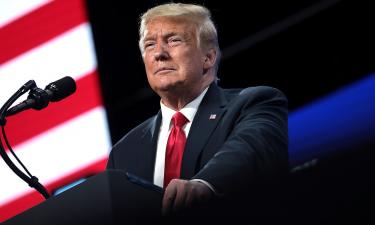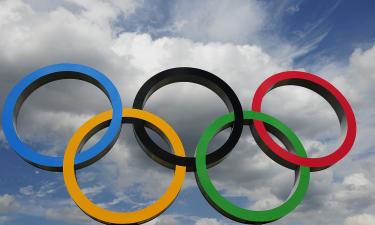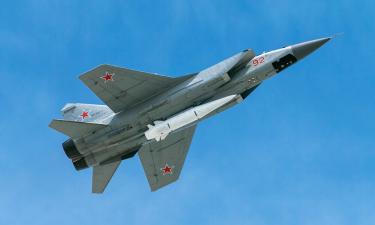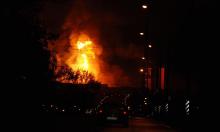Pravda.Ru interviews Hamas leader: We will definitely win war with Israel
Pravda.Ru special correspondent Daria Aslamova spoke with one of the leaders of Hamas movement, Dr. Musa Abu Marzouk. During the interview, Dr. Marzouk shared his views on the future of the Gaza Strip, how it is going to be released from Israeli aggression and why the Palestinians cannot lose in this war.
Good afternoon, Dr. Abu Marzouk. First of all, how can we introduce you to our viewers, our readers? They say about you that you are one of the main ideologists of Hamas, one of the leaders of Hamas. They also call you the "informal minister of foreign affairs.” Is it so?
Indeed, I am one of the founders of the Hamas movement. Maybe I have been active throughout the entire time and also as the head of Hamas before, maybe even after the developments in Gaza, on the West Bank. And my activity is international relations. Maybe it gave me the right to be known as a politician. But, in fact, I am an engineer by training. I received my bachelor's degree in Egypt and my doctorate in the USA.
This is not your first time in Moscow. As far as I know, you have been here before. What is the purpose of your visit to Moscow? Who are you planning to do?
This visit is, in fact, an ordinary visit, since our relations with Russia are developing. I visit Russia at least twice a year. But this time it has special significance, because we are now at war, especially against the backdrop of Israeli aggression. Such a number of victims, genocide committed by Israel, so many civilian casualties in the Gaza Strip. Therefore, we need to talk with our colleagues, with the Russian leadership. We discussed many issues related to our region. Since Russia has a relationship with all Palestinian representatives, we discussed the issue of a Palestinian truce.
Do you mean with Fatah?
With Fatah and with other Palestinians. We also hope and strive for Russia's role in international politics to be more active. We are confronting the United States and its policy in the region. We are discussing the role of Russia in the international arena, but we also discuss issues related to prisoners of war and their exchange — the ones at Hamas, but these are prisoners of war who have dual citizenship, for example Israeli and Russian citizenship. We discussed the issue of their release.
How many prisoners of war are there? Russians with Russian citizenship?
There were six of them.
But these prisoners were captured during the fighting and taken to military bases. At first, no one said anything about their second citizenship. But they started talking about citizenship, that they were Russians. All the prisoners we have are the ones with dual citizenship. That's why we have Americans, Italians, French, Germans, Belgians — almost all of them have dual citizenship. When we captured them, we in fact captured Israeli soldiers. But after they were captured, they began to talk about their second citizenships.
The President of South Africa called me. The head of their intelligence services asked us about one particular prisoner. When we started looking into the question, we found that he was actually a tanker, he was captured in his tank. And then when they started the war, they started saying he was not a citizen of Israel, but a citizen of South Africa.
We are now in the midst of the Hamas-Israel conflict. What kind of help do you expect from Russia? Is this just negotiations between various Palestinian factions or something else?
Russia, of course, is an influential international player and such a vast country, with such importance, plays a big role in international politics. America's position in general and its position after October 7 has weakened considerably. The significance of the United States in the region has decreased significantly as well. Therefore, we count on Russia to play a greater role in international politics. Russia can play a big role in international politics, especially a part of the BRICS now, as in addition to Brazil, China, South Africa, Russia, India, the Saudis and the Emirates have joined this organization. Within the framework of this union they can play a big role in the politics of the Middle East. Therefore, Hamas wants Russia to stand up against the United States on this issue regarding Palestine and the Middle East. We trust Russia just as Israel trusts the United States. Yes, maybe the balance of forces here is not equal. But we are still interested and we trust Russia, we want Russia to play a role at this point.
The October 7 attack itself, which Hamas carried out on Israel, was obviously well prepared. Did you expect such consequences? Did you expect such a large-scale extermination afterwards? Or do you find Israel's acts of genocide surprising?
We did not expect aggression of this scale, because it was an unprecedented crime in the history of mankind. In 100 days, more than 23,000 civilians were killed, 70% of whom were women and children. And the peculiarity of this is that all this happens on cameras and television screens. And the whole world is watching. This is not the way it was before, but today everyone can see everything. But here I want to clarify two points. This is not the first massacre that Israel has committed against Palestinians. Since 1948, Israel has carried out dozens of acts of massacres against Palestinians.
They believed that a good Palestinian is a dead Palestinian, or a Palestinian who is outside of Palestine. And the second point is direct US support for Israel in crimes against civilians in order to gain political pressure on Hamas so that they can retreat. Therefore, US policy is to pressure and punish civilians in order to obtain a political result or political success afterwards, just as happened in Vietnam, Japan, Afghanistan, and Iraq.
How do you plan to win this war?
In two ways. The first is the resilience of the Palestinian people, their love for their land and their willingness to defend it. You have probably already seen how the Palestinians refuse to be expelled from their homeland, despite the fact that everyone has lost a large number of their relatives, loved ones, and even some of them are still under the rubble, but the Palestinian people insist that they defend his land — they do not accept another land as their homeland. The second way is military resistance against the Israeli army. And we have succeeded a lot in this regard. Therefore, over the past 100 days, the enemy has lost thousands of its tanks, and hundreds of soldiers, thousands were injured.
The Israeli society has been suffering damage because of this war as well. Israel is waging war and the Israeli do not know its purpose. In the beginning they already declared their goals, which they could not achieve. At first they thought that they could just fight like this for one week and achieve all their goals, but today they have been into this war for 106 days, and they have not achieved any goals in Gaza.
Do you have mainly political and military allies in this war that you are now waging with Israel?
We, of course, have relationships with different states in the region. Naturally, the United States has a great opportunity to put pressure on their decisions in the region, but for now we still keep in touch with them. Our real ally is the peoples: the Islamic, Arab peoples. Today we can notice how in Europe, especially in the USA, thousands of people go to rallies in support of Palestine. The crisis in Palestine has become the most important one all over the world for so many peoples.
The most pressing news right now is that Israel is already planning not just to occupy the territory of Gaza, but to build settlements there. What kind of future does Gaza have in general?
Everything you said about the Gaza Strip and Israel has not happened yet, because the Israeli army is retreating, they are leaving these areas, the people are returning there, and Hamas will reestablish its control of the region. And even in the north now, Israel admitted that Hamas has managed to restore its military strength and has resumed its military activities in northern Gaza. or example, Beit Hanoun is the first place that the Israeli army entered at the beginning of the war, and they still cannot control this area, and there is fierce resistance on the battlefield.
Who do you think is winning in this war?
We will definitely win.
In a military sense, you are sure of that. The war between Israel and Hamas caused a chain reaction in the world. We now see the entire Middle East has become uneasy. We see the situation in Iran, Pakistan, we see what is happening in Syria, Iraq. That is, the feeling that the conflict in Gaza triggered a general crisis in the region. Are we heading towards World War III?
Of course, we don't expect war, we don't think that World War Three is going to break out. But the war in the region takes place between two unequal parties, so victory in this type of war is to prevent the enemy from achieving his goals. If we interfere and do not allow the result to be achieved, then this will be a victory for us. Beirut and Yemen have already started this war. Iraq also got involved. And we think that there will be reactions and consequences in all Arab countries after this war, there will be changes. And the main reason is that America helps and supports Israel in the international arena, at the UN Security Council. The US helps with weapons, Washington provides military and financial assistance.
Do you think that the crisis is not going to affect all of the Middle East?
No, of course not. I don't think it will be like a major Middle East war, but it remains within the framework of the Israeli-Palestinian war. The crisis may either escalate or subside, based on the time frame that Israel can withstand and continue its aggression. When the aggression ends, I think everything will end in the region. And the longer Israeli aggression continues, the wider the escalation will expand in the region. South Africa filed an application to the International Court accusing Israel of genocide in Gaza, and Indonesia filed an application to the international court accusing Israel of genocide.
You are one of the main leaders of Hamas, for Israel you are one of the main enemies. Were there any attempts to assassinate you? You are in a very dangerous situation.
I don't think Israel will do it all at once, because they know very well that every action leads to counteraction, so I think they calculate their steps before committing a crime.
What relationship does Hamas have with Fatah and the Palestine Liberation Organisation?
The Palestine Liberation Organisation is an organisation that represents all Palestinians. We at Hamas strive and demand to become part of this organisation. We also strive for a truce with Fatah, so that we have one program, one unity of people and power.
Last personal question.
You are actually a refugee, you were born in Rafah, if I'm not mistaken, in Gaza. You are a person who has actually been stateless all your life, a person without a passport, like most Palestinians. What is it like to live your whole life without citizenship, without a passport and without any rights at all?
I am proud, of course, that I am a Palestinian, a citizen of Palestine, even if the international society does not want to admit that. And yes, Palestinians have the right to be recognised as Palestinians. But the international society knows that the Palestinians among all Arabs are the most educated, literate, civilised people. And I have a document for traveling, like a passport, it's Egyptian, but I never felt the freedom of movement as I experienced it when I entered Gaza. Therefore, Palestinians are found in virtually all states and countries in the region. And this is the motive that pushes them to be part of liberation organisations or movements in the region. I was born in 1951 in Rafah, and in 1967 I visited my home village and I saw my home there. And there was a Jewish family from Yemen, Jews living in this house. My father was standing nearby.
I saw tears rolling down his cheeks when he looked at his house, which he had built with his own hands, he saw the trees that he had planted in the ground, and a Jewish family who came from Yemen and occupied our house was collecting the fruits from those trees. Therefore, my motive has always been to return to that particular house, my home, and my people also want to return to their homes from which they were expelled. And we will resist until we achieve this goal.
Thank you very much for the interview and for the honour you did to me.
Thank you very much.
Subscribe to Pravda.Ru Telegram channel, Facebook, RSS!




